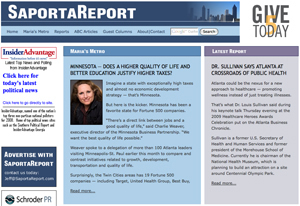In 1982, when I worked for the newspapers in Greenville, SC, I not only labored in the newsroom — writing, editing and designing the pages of the daily papers — I also walked the streets of my neighborhood just a few hundred yards north of downtown on North Main Street, delivering the paper to readers’ front steps.
As I carefully dropped the paper at my customers’ front doors, I remember being puzzled by the few neighbors — and there were only very few — who did not subscribe to either the morning or afternoon paper. I would drop off a sample copy with a handwritten note, asking if I could start delivering them a daily paper. I was usually successful in my sales effort, though there were a few intransigent ones.
These days, I walk out my front door and grab three newspapers delivered at 6am to my front yard: the AJC, the Wall Street Journal and, on weekends, the New York Times. Each morning, I remember that I am participating in a dying ritual, and it saddens me.
My days are numbered. As I watch our deliveryman drive down the street, I am amazed by how few — and there are only a very few — yards into which he tosses a paper or two. Sometimes I even feel responsible, as if I’m letting a 250-year-old American tradition die on my watch.

It’s not for lack of trying. I worked at six different daily newspapers in the South (including my hometown AJC) before starting my own monthly newspaper group in Intown Atlanta in 1994. But each day I read of yet another daily newspaper closing its doors. In fact, at least 120 newspapers in the U.S. have shut down since January 2008, according to Paper Cuts, a Web site tracking the newspaper industry. More than 21,000 jobs at 67 newspapers have been eliminated in that time, according to the site. These stats hit dangerously close to home. My prediction is that my AJC won’t be delivered to my home on Mondays and Tuesdays by the end of this year. Their business model is that fragile.
There are exceptions, thankfully. The Wall Street Journal showed a fraction of an increase in circulation last year. Locally, the weekly Atlanta Business Chronicleincreased its circulation last year by three percent — following other years of similar or larger gains. We maintain several subscriptions, to our office and our homes.
The Chronicle started the month after I graduated from college and for more than 20 of its years, the team of Publisher Ed Baker and Editor David Allison has delivered a well-respected paper, tightly focused on Atlanta’s business community. In addition to their print edition, they deliver a daily 3pm news alert via email, make their print edition available online to wacky folks such as me who download it as early as 5am Fridays.
In a sign of the times, the AJC’s well-respected business columnist Maria Saporta took a buyout from the daily paper and joined the ABC staff last year, where her years of institutional Atlanta knowledge will be a significant asset.
Maria is not content to write for the ABC alone. Schroder PR proudly designed and maintains her independent website, SaportaReport.com, which I predict will be one of the top 10 destinations to get local news and perspective in the coming decade of journalism’s evolution to the web.

Our PR firm has evolved too. Nearly half of our revenue comes from writing and designing websites, producing videos, delivering eNewsletters for our clients and increasingly entering into the social media space.
I already have a laptop and an iPhone. I imagine this summer, I’ll give in and buy the new Kindle DX, a hand-held digital reader with a nearly-10-inch screen to which you can download books and hundreds of newspapers.
You may find me still sipping coffee on my front screen porch, reading the morning “paper” on my Kindle. I will be as well informed, but I won’t be as happy. For I will miss the sound of the morning papers hitting my sidewalk and the hours I now enjoy each day, turning their pages. I’ll miss the smell of newsprint and ink that has seeped deeply into my blood, on whose behalf I have sweated for decades and for which I will shed tears of sorrow to see them disappear.








